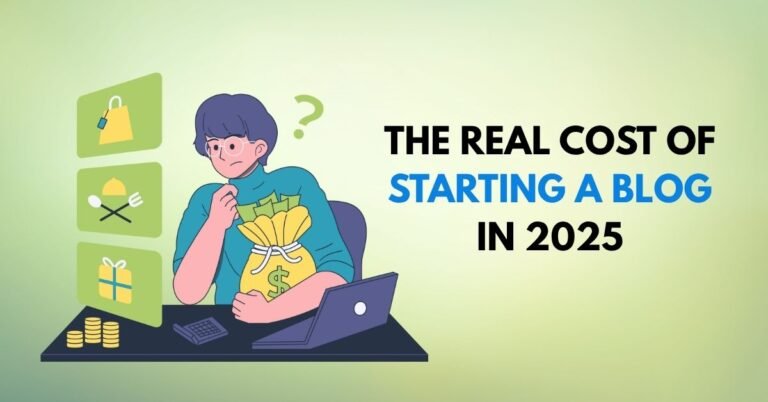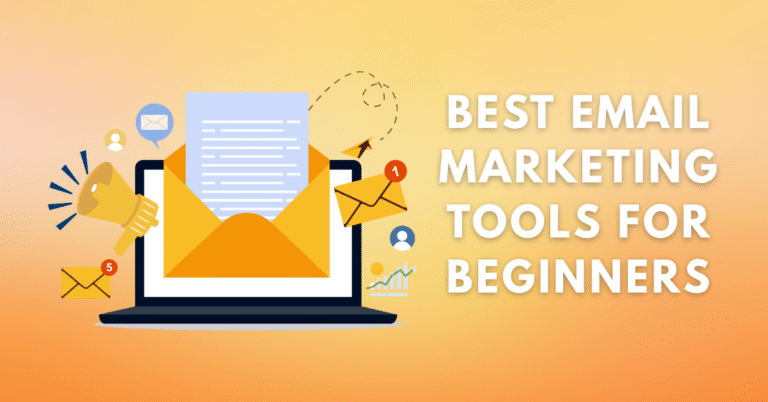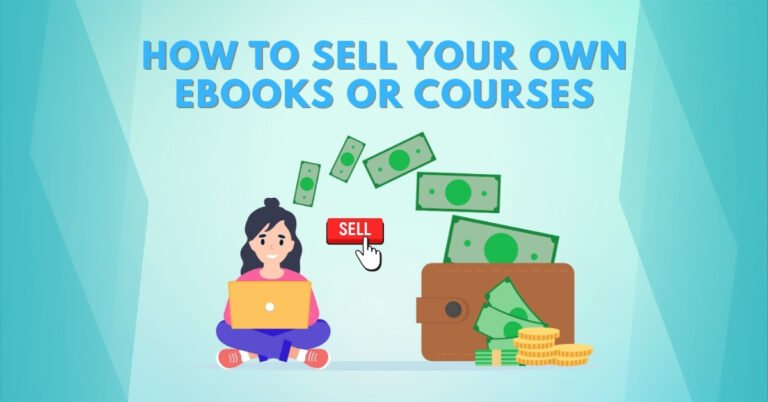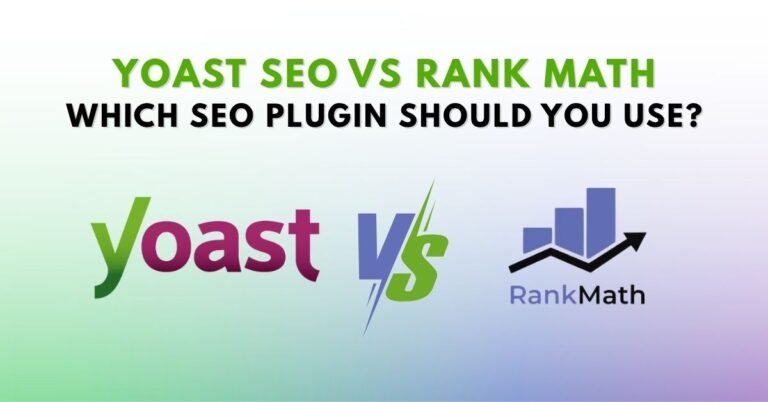Email marketing remains one of the most powerful tools in a blogger’s toolkit. Whether you’re just starting out or looking to level up your content strategy, having the right email marketing platform is key to building your audience, nurturing relationships, and monetizing your blog.
In this guide, we’ll explore the top 10 email marketing tools—both free and paid—perfectly suited for beginner bloggers. You’ll find platform features, pricing, pros and cons, and tips on how to choose the right tool for your blogging journey.
Why Email Marketing Matters for Bloggers
Before we dive into the tools, let’s cover why email marketing should be part of your strategy:
- Build a loyal audience: Email allows you to communicate directly with your readers.
- Drive repeat traffic: Share blog posts, product updates, or affiliate promotions.
- Monetize your list: Promote your own products or affiliate offers directly to subscribers.
- Own your audience: Unlike social media, your email list is yours, not controlled by algorithms.

What to Look for in an Email Marketing Tool as a Blogger
- Easy-to-use drag-and-drop editor
- Affordable pricing or generous free plan
- Integration with WordPress and lead generation tools
- Automation and segmentation features
- Analytics and deliverability
Let’s now explore the best tools that match these criteria.
ConvertKit — Best for Content Creators
ConvertKit is designed with bloggers and creators in mind. Its clean interface, powerful automation, and subscriber tagging system make it ideal for beginners and advanced users alike.
Key Features:
- Visual automation builder
- Tag-based subscriber management
- Landing pages and signup forms
- Integrates with WordPress, Shopify, and more
Pricing:
Free for up to 1,000 subscribers. Paid plans start at $15/month.
Pros:
- Creator-focused features
- Easy automation setup
- Great support and documentation
Cons:
- Limited templates
- Can get pricey as your list grows
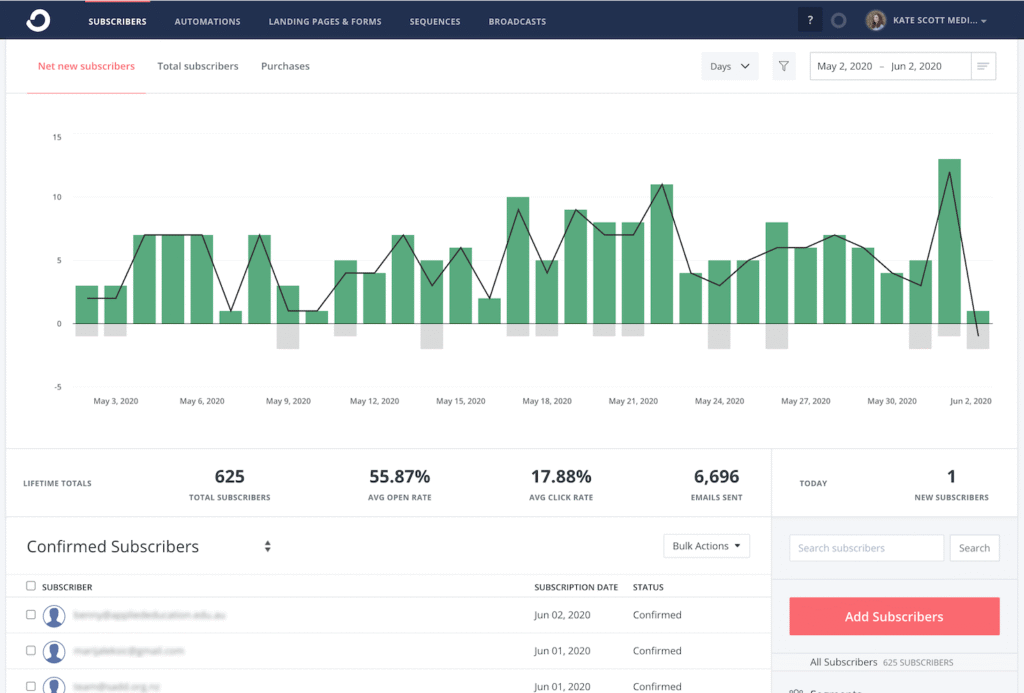
MailerLite — Best Budget-Friendly Option
MailerLite offers advanced features at a very competitive price. It’s perfect for bloggers who want to automate without breaking the bank.
Key Features:
- Drag-and-drop builder
- Automation workflows
- Landing pages & pop-ups
- A/B testing and segmentation
Pricing:
Free for up to 1,000 subscribers (12,000 emails/month). Paid starts at $10/month.
Pros:
- Clean, intuitive interface
- Great deliverability
- Generous free plan
Cons:
- Limited email templates
- Approval process for new accounts
Mailchimp — Best for Beginners
Mailchimp is one of the most recognized email platforms. It’s great for bloggers new to email marketing who need an easy entry point.
Key Features:
- Pre-built templates
- Basic automation
- Audience segmentation
- Built-in analytics
Pricing:
Free up to 500 contacts. Paid plans from $13/month.
Pros:
- Beginner-friendly
- Lots of integrations
- Trusted brand
Cons:
- Limited automation in free plan
- Interface can be clunky
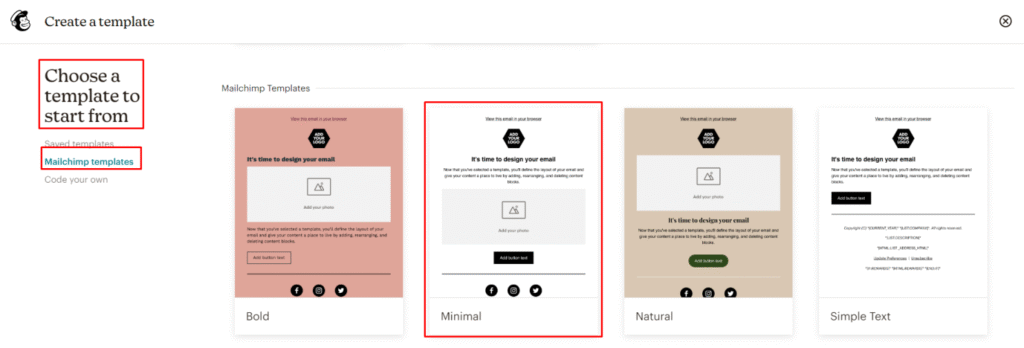
Sendinblue (Brevo) — Best for Email + SMS
Sendinblue (now Brevo) is an all-in-one marketing solution offering both email and SMS marketing. It’s especially useful for bloggers running promotions or ecommerce shops.
Key Features:
- Email & SMS campaigns
- Drag-and-drop builder
- Advanced automation
- Transactional emails
Pricing:
Free up to 300 emails/day. Paid plans start at $25/month.
Pros:
- Email + SMS marketing
- CRM features
- No contact limit on free plan
Cons:
- Daily send limit on free plan
- Learning curve for automation
GetResponse — Best All-in-One Tool
GetResponse offers more than just email—it includes funnels, landing pages, webinars, and automation tools perfect for bloggers with big ambitions.
Key Features:
- Funnel builder
- Email marketing + webinars
- Conversion-focused features
- AI subject line generator
Pricing:
Free up to 500 contacts. Paid starts at $19/month.
Pros:
- Great for advanced users
- High conversion tools
- Detailed reporting
Cons:
- Slightly overwhelming for beginners
Moosend — Best for Simple Automation
Moosend is a lesser-known but powerful email platform with affordable pricing and solid automation capabilities.
Key Features:
- Drag-and-drop email builder
- Automated workflows
- Real-time analytics
- Landing pages and forms
Pricing:
Free trial for 30 days. Paid starts at $9/month.
Pros:
- Affordable and simple
- Powerful automation
- White-label options
Cons:
- Not many integrations
- Limited design templates
Benchmark Email — Great for Simplicity
If you want an email tool with minimal setup, Benchmark Email is a great choice. It offers a straightforward editor and useful templates.
Key Features:
- Email templates
- List management
- Automation workflows
- Real-time reporting
Pricing:
Free for 500 subscribers. Paid from $13/month.
Pros:
- Easy to use
- Fast setup
- Email automation included
Cons:
- Not as flexible as others
- Limited support on free plan
AWeber — Good for Affiliate Bloggers
AWeber has been around a long time and is trusted for its deliverability and affiliate-friendly terms.
Key Features:
- Prebuilt autoresponder series
- AMP for email
- Integrates with most platforms
- Great support
Pricing:
Free for 500 subscribers. Paid plans from $20/month.
Pros:
- Great for affiliates
- Built-in templates
- Strong community
Cons:
- Slightly dated interface
- Pricey at scale

TinyEmail — Best for Simplicity & Design
TinyEmail focuses on beautiful, clean email design with an emphasis on simplicity—perfect for bloggers who value aesthetics.
Key Features:
- Pre-designed templates
- Automation features
- AI-powered personalization
- Shopify integration
Pricing:
Free plan available. Paid from $15/month.
Pros:
- Elegant designs
- Fast to launch
- Lightweight UI
Cons:
- Not ideal for large lists
- Still growing feature set
HubSpot Email Marketing — Best for Scalability
If you’re planning to turn your blog into a business, HubSpot offers a free CRM with email marketing and plenty of advanced features as you scale.
Key Features:
- CRM integration
- Personalization
- List segmentation
- Drag-and-drop builder
Pricing:
Free plan with basic features. Paid plans start at $45/month.
Pros:
- Great CRM integration
- Free to start
- Scales well for businesses
Cons:
- Pricey advanced features
- Learning curve for full suite

How to Choose the Right Email Marketing Tool
Consider the following when choosing your tool:
- Your current list size
- Budget (free vs paid)
- Features like automation, segmentation, and integrations
- Your blogging goals (affiliate marketing, product sales, traffic)

Final Thoughts: Start Growing Your Email List Today
Email marketing is a must for any blogger looking to grow their audience, build trust, and earn income. Start with a free plan, learn the ropes, and upgrade as your blog grows.
All the tools listed above are beginner-friendly, reliable, and offer the features you need to start building your email list today.
FAQ: Email Marketing Tools for Bloggers
Once per week is a great starting point. Consistency matters more than frequency.
Yes! Email helps you build direct relationships with readers and is one of the most effective ways to drive consistent traffic.


